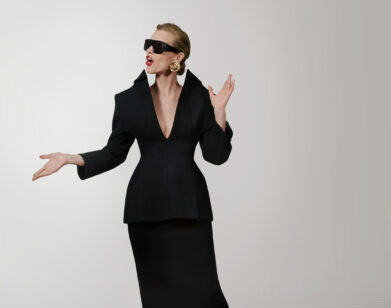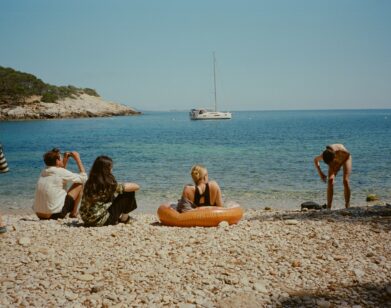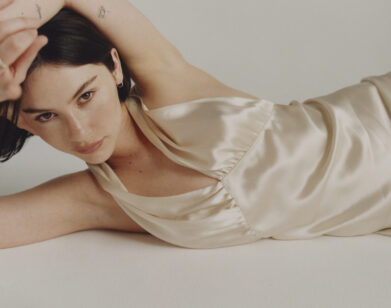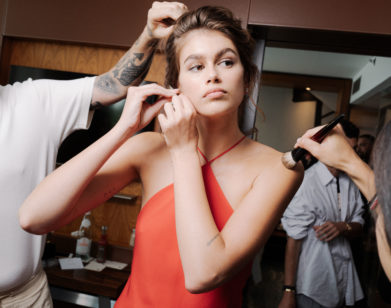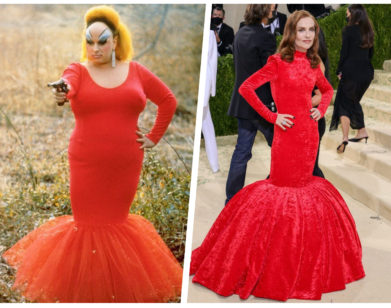IN CONVERSATION
Lily McInerny and Kaia Gerber on Heartbreak, Hedonism, and Healing on Camera
For some actors, the right role can change your life, and for Lily McInerny, playing the precocious teenage Cécile did exactly that. “There was a version of myself before shooting this film and a version of myself after,” she says. “And I like the version of myself after a lot more.” In the new adaptation of Bonjour Tristesse, the directorial debut of the writer and former magazine editor Durga Chew-Bose, the bittersweet, decadent coming-of-age story written by then-18-year-old Françoise Sagan makes its way to the big screen once again. Nearly 70 years after Otto Preminger’s beloved take, McInerny went down an obsessive rabbit hole of Hemingway, Altman, and French new wave to inform her performance. Another fervent fan of the novel is Kaia Gerber, fresh off her own run in Will Arbery’s play Evanston Salt Costs Climbing. To decompress after two demanding roles, the young actors got on the phone earlier this month to talk about embracing hedonism and letting your freak flag fly.
———
KAIA GERBER: I’m so excited to do this. I haven’t seen the film, which is really sad and upsetting, but I will be seeing it.
LILY MCINERNY: I didn’t expect you to, it just hit theaters. I’m just so grateful that you’re here.
GERBER: No, but I love this book so much. I read it as a teenager and always revisit it. When I heard that you guys were adapting it, and that it was Durga [Chew-Bose], I was so excited.
MCINERNY: I remember speaking with you about how connected you were with the novel, so when this opportunity came up, you were the first person to come to mind.
GERBER: Had you read it before or was this project the first time you heard about it?
MCINERNY: I actually hadn’t even heard of it, but of course, immediately after finding out, I ran to McNally Jackson and I picked up the first copy I could find and devoured it. I became subsequently obsessed with Françoise [Sagan] and her entire body of work. The lifestyle she led was so radical and so aspirational. So I’m a new fan, but I’m a big fan, and she was a big part of my preparation for the role.
GERBER: What I love so much about her work is that it’s semi-autobiographical. You really get to know her through reading her, and all my favorite authors are that way.
MCINERNY: Absolutely. I’m really attracted to work that is extremely vulnerable and sacrifices a lot of privacy and intimacy for the audience. I feel the same way with performers. A lot of my favorite performances feel emotionally like they offer up a person’s soul. In my own work, I always say the worst thing I can do is protect myself. When the cameras aren’t rolling, I’m very protective of myself and those around me. But as soon as I jump into a scene, I think it’s essential for me to let go of that self-preservation. I feel so much more liberated working on scripted content than I do just speaking off the cuff. The container of fiction gives me the freedom and the permission to be fully vulnerable.
GERBER: You are so great in Palm Trees and Power Lines, and that is a performance that there’s nowhere to hide in. I feel very much the same about theater. There’s really nowhere to hide, because it’s terrifying and simultaneously liberating. That’s sort of what I gravitate towards.
MCINERNY: I remember the last time we spoke was before you’d done any stage work, and I remember hearing your excitement and desire to have that new experience. I’m sad I haven’t been able to experience anything you’ve done on stage here on the East Coast.
GERBER: Isn’t that the great thing about theater? The people who were there at the fleeting moment experienced it, and that’s it. Someone came up to me yesterday and they were like, “I saw you in this play.” And it feels like you shared this really special moment with someone.
MCINERNY: Oh, completely. When people recognize me for any of the stage work I’ve done, it’s more memorable and meaningful than any film just [because of] that relationship you have to the audience.
GERBER: Yeah. Like, with a film, while you’re making it, you’re not thinking about the people that will be consuming it, whereas with theater, you have to accept that. What was the process of filming this like, and did you guys have a lot of preparation time?
MCINERNY: This was still a very small film. We weren’t working with a large budget, therefore we couldn’t really afford ample rehearsal time. That being said, I think Durga and our producers, Katie [Bird Nolan] and Lindsay [Tapscott], really went out of their way to try to carve out as much time as possible. Claes [Bang], who plays my father, and I had the most rehearsal time. We were able to arrive in the village Cassis a couple of weeks prior to shooting and have two weeks to really hang out. Some of that time was in formal rehearsal, but a lot of it was just spending time together and discovering each other’s personalities and idiosyncrasies and body language and building that nonverbal subconscious connection. That was really invaluable. I’ll also say that Durga created an environment on set that felt like every minute was really maximized, and the tone on and off camera was equally sort of tender and supportive and emotional. That transition between our downtime and rolling made the entire experience really immersive and it almost acted as a form of character work. Being able to make this film in France and it being such a beloved French classic, there were crew members who took really long commutes and put their lives on hold just because they were so passionate about the original novel and everyone involved.
GERBER: Is there pressure in doing an adaptation? How did you quiet the knowledge that people already have expectations? Because no matter what you guys create, it will never be what everyone’s imagination is.
MCINERNY: I think as you’re reading, especially a book like Bonjour Tristesse, which is written in the first person, everybody sort of projects themselves onto the protagonist. And adapting a novel like this, a novel that I love so much, was like being able to actualize that fantasy experience for the first time. It was essentially LARPing one of my favorite characters in literature.
GERBER: Which is such a joy because we do that in our imaginations anyways. Was Cécile someone that you related to right away, or did she take time to reveal herself to you?
MCINERNY: I related to her in so many ways, as I think a lot of people do. When I first read it, I was kind of taken back by just how relatable certain commentaries on society and on womanhood felt, despite it being written 75 years ago. It was honestly shocking just how modern and relatable it felt. And there is a sort of excitement you feel when a private thought you had, that you thought only you had, becomes expressed externally.
GERBER: You realize, “Oh, this is something that people have been experiencing since the beginning of time.”
MCINERNY: Exactly. Like, I am completely unoriginal in the best possible way. I’m living the same life as generations of women before me. Even parts of her that I didn’t relate to ended up expanding my comfort zone and my sense of self and unlocking this level of inhibition that I hadn’t felt previously. There was a version of myself before shooting this film and a version of myself after, and I like the version of myself after a lot more.
GERBER: Yeah. You can’t become an entirely new person, but you sort of turn the volume up on certain parts of yourself and turn it down on other parts. What parts of yourself do you think were at the forefront while playing Cécile?
MCINERNY: I think the pursuit of pleasure became the guiding factor for my approach to the character. There’s a level of hedonism that I’ve always possessed. If you ask friends of mine, they’ll describe that in my daily life. But the way I was raised and the way I moved through the world as a young adult, I had a lot more responsibility and people-pleasing tendencies versus in Cécile. So giving myself full permission to indulge those more hedonistic tendencies and embrace certain vices or hypocrisies within myself was really liberating.
GERBER: I read Bonjour Tristesse first when I was Cécile’s age, and then every time I’ve revisited it I kind of have a different perspective. Did playing Cécile change the way that you look at your own teenage years? What parallels were you able to find, since now you’re older than she actually is?
MCINERNY: It gave me a lot of forgiveness and compassion for my younger self. I think as I entered my early 20s, I looked back on my teenage years with cringe and judgment, the way I lashed out at times. Being able to regress through the character, I discovered a newfound appreciation for the heightened sensitivity of a teenager. There’s something really special about feeling so strongly and having your mind run a million miles a minute. You’re on the precipice of adulthood and have this level of clarity towards the injustices of the world before you become jaded to them.
GERBER: Yes. I think about my first heartbreak and how devastating it was, and then I look back and I’m like, “Was I even in love? Was that a relationship? Was that a heartbreak?” But sometimes, with perspective, we can make those memories void of the emotion and talk ourselves out of what really was real. What was it like reinserting yourself into those emotions?
MCINERNY: It was very healing, I would say. I think one of the best parts of our job as actors is being able to cultivate empathy for antagonists and for complicated people. I think I grew a lot from this.
GERBER: I also think there’s a sort of common trope—I don’t know if I believe this or not—that heartbreak or pain makes you a better artist. I’m sometimes like, “Am I seeking it out to be better at my job or to feel more deeply?”
MCINERNY: Well, I’m honestly of the belief that emotional self-preservation is critical for the kind of work that we do. Our emotions being our chosen medium, you have to be careful not to be reckless with them, and you have to protect them off camera. Once we’re in the work, we can let our freak flags fly. But I’m of the belief that heartbreak, self-flagellating, and ruminating are not actually the best for your work in the long-term. Although I don’t think there’s any human experience that can’t be transformed into something beautiful and worthwhile. I don’t think that conflict is avoidable when you’re working on something creative because opposition is where some of the best ideas are born.
GERBER: Yeah. Do you have any rituals to let characters go at the end of a day or a project? Because I sometimes feel like it can be a slow exorcism to release a character when you’re done.
MCINERNY: Oh my goodness, I’m so glad you mentioned that. I don’t think enough people talk about that. A lot of actors go into depth about preparing for a role, but neglect to talk about the feeling of moving on from that experience.
GERBER: Especially on a project like yours. It’s so immersive what you went through.
MCINERNY: Absolutely. There’s a very real grieving process that happens at the end of a project for me, because I do fall so deeply in love with these characters and imaginary worlds. There’s one anecdote that comes to mind while we were shooting Bonjour Tristesse. Durga was really considerate, given the limitations of indie filmmaking, about trying to shoot as chronologically as possible. Actors appreciate that so much. But she actually ended up scheduling the very last shot of the movie as the final scene that we shot.
GERBER: Wow.
MCINERNY: So I knew going into it, the very final frame was the last time I would actually be Cécile.
GERBER: I’m going to cry.
MCINERNY: I know. It gives me chills to this day. It was a really, really emotional day, or night. It was 4:00 in the morning,
GERBER: Oh my god.
MCINERNY: It’s a really powerful and technically complicated dolly shot where I had a camera rotating around me on a pretty close lens, and it’s just my face. And my character’s not supposed to be crying in that moment. I’m always choking back tears in the scenes when I’m not supposed to be crying. [Laughs] But knowing that that was the last moment I would be with Cécile, and also the last moment the audience would be with Cécile, was really intense and beautiful and heartbreaking.
GERBER: Were there scenes you were nervous about or thought would be most challenging?
MCINERNY: I love that question. Shooting anything in the water was a huge challenge. In fact, there were very few scenes cut from the film, but the few pieces of dialogue that were, were ones that we had to do while treading water in the Mediterranean. It was June, so it was lovely outside, but the water itself was still quite cold. I remember I stepped on a sea urchin in the middle of the scene. We were just figuring it out as we went along. Then of course there was seasickness on the day we were shooting on a sailboat.
GERBER: Right. Because the scene is three or four minutes, but you’re on that boat all day.
MCINERNY: Exactly. Thankfully, my scene partner Aliocha [Schneider] and I were among the very few people who didn’t get seasick, but otherwise, we had people operating cameras that weren’t usually operating them and Durga was directing us from a walkie-talkie. We just had to get creative and figure it out.
GERBER: You had such a wonderful point of reference preparing for this, but were there other art forms that you were ingesting in preparation?
MCINERNY: That’s a great question. I always end up subconsciously creating this media diet in anticipation of any role I’m going into. I try to curate every art form that I consume, whether it’s music or film or books, in a way that informs the project. At the time, I was actually reading The Sun Also Rises by Hemingway, which is sort of related to that early French literary world and that Parisian summertime with desires unmet and conflicting loyalties. That book explores a lot more about defining masculinity versus femininity, but I think they go hand-in-hand just in discovering one’s identity. Durga actually wrote me out this amazing read and watch list in one of our meetings. I have it in my Bonjour Tristesse character journal with me.
GERBER: Oh my gosh, you have a journal too. Do you do that for all your characters?
MCINERNY: I do. I did a lot of journaling and character work as I prepared for the role, although the novel itself filled in a lot of character work that I usually do independently since it’s written so vulnerably and in first-person. So Durga included Three Women by Robert Altman, which makes perfect sense and is also one of my all-time favorite films.
GERBER: Incredible. Me too.
MCINERNY: Marguerite Duras, The Lover.
GERBER: I was going to talk about The Lover because they’re both about a young woman sort of figuring herself out.
MCINERNY: I completely agree, especially the way that it speaks about desire and sexuality so candidly from the female perspective. There are a lot of similarities between Cécile and the protagonist of The Lover, just in the way that they enjoy sex but they aren’t particularly romantic. Then there was À Nos Amours. Have you seen that film?
GERBER: I haven’t.
MCINERNY: There were some direct references in the actual visuals of the film. I hadn’t really discovered French new wave films prior to becoming attached to Bonjour, and Rohmer and that whole world has since become a huge love of mine. Durga also made me a playlist that we collaborated on.
GERBER: Oh, incredible. It covers all the senses. Music is a big one.
MCINERNY: Yeah. And it was fun setting our film in the current day, because the music went through decades.
GERBER: Cécile in today’s world, who would she be listening to if she could have a Spotify?
MCINERNY: Oh, there was a lot of Sky Ferreira and The Strokes. I could even send you the actual playlist.
GERBER: Yes, please.
MCINERNY: Durga’s so particular in every way, but especially in her music choices. There were needle drops written into the script. And watching the film for the first time, that was one of the things that stood out to me the most, the way that the music sort of moves the narrative forward, as well as the original score by Leslie Barber, who’s incredible.
GERBER: Right. Music or withholding a score is so emotional in a film. I think that’s why a lot of people can’t watch themselves, and I have a hard time. There’s so much that happens in post-production that really informs what the film becomes, and there’s such joy in seeing what has happened after you’ve had to let it go.
MCINERNY: I don’t like watching myself either, but I love being able to appreciate the work of everyone else.
GERBER: I guess I’ll end with asking, has this film changed or informed what kind of projects you want to do next?
MCINERNY: I think that one of the best parts of my experience on this film was the comfort and compassion I received from the people I made it with. Our producers really prioritized a pleasant working environment, childcare, and other simple comforts that don’t cost a lot, but go a really long way. That perspective—that struggle isn’t necessarily conducive for creativity—really inspired me. I don’t know if it set a precedent, because I understand in this industry you can never predict the environment you’re walking into, but it certainly set an ideal.
GERBER: And you’ve seen that it’s possible, even on an indie film. That’s kind of what we all strive for.
MCINERNY: It was a magical time.
GERBER: I could literally talk about this book to you forever.
MCINERNY: We can find time.
GERBER: I’ll be back. Are you in New York?
MCINERNY: I am.
GERBER: I’ll be there in two weeks, so I would love to see you.
MCINERNY: I love that. Thank you so much for doing this.
GERBER: I’m so excited to see it.






